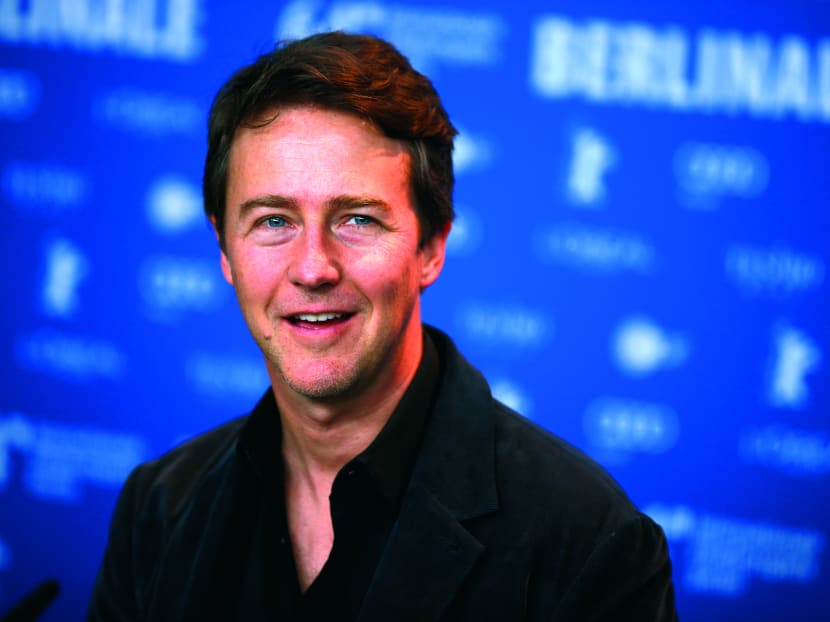Edward Norton loves working with Wes Anderson
SINGAPORE — The hullabaloo that erupted when Edward Norton first broke into Hollywood in 1996 was completely justified, his fearless performance in Primal Fear earning him an Oscar nomination.

Edward Norton hearts Wes Anderson. Photo: Reuters
SINGAPORE — The hullabaloo that erupted when Edward Norton first broke into Hollywood in 1996 was completely justified, his fearless performance in Primal Fear earning him an Oscar nomination.
His refusal to be pigeonholed, a career-long mantra, would lead him to seek out a myriad diverse characters in films such as Fight Club and American History X — and eventually, into the unusual world of director Wes Anderson.
After playing an inept boy scout leader in Moonrise Kingdom, the 44-year-old now stars as Henckels, the captain of the Lutz military police in Anderson’s vividly imagined The Grand Budapest Hotel.
A fan of Anderson’s work since the director’s feature film debut, Bottle Rocket, Norton is part of an all-star ensemble cast which includes Adrien Brody, Willem Dafoe, Jeff Goldblum, Jude Law, Bill Murray, Tilda Swinton, Tom Wilkinson and Owen Wilson. Set in the 1930s, it recounts the adventures of Gustave H, a legendary concierge at a famous European hotel, and Zero Moustafa, a lobby boy who becomes his most trusted friend.
Q: What’s it like working with a director like Wes Anderson?
A: Wes and I had sort of exchanged mutual appreciation a long time ago. He saw me in a play and sent me a really nice letter, and I had written him about some of his films. I think I wrote him a letter about (the film) Rushmore, when it came out. We both live in New York. I think we both had this notion that maybe it would be great to do something, but I never pressed on it, just because it has to come from Wes. He has such a specific set of visions and I think you have to fit within it. Now that we’ve worked together we really enjoyed it. Also, I think Wes likes to work with people and if he feels that you’re at home within the “repertory company” feeling of what he does, that gives him a good conviction.
Q: How did the shooting of the film go?
A: We filmed mostly in this very small town in Germany called Gorlitz. Wes and Jeremy (Dawson, producer) had done their thing. They had picked a very modest little hotel, and essentially did a deal with them to make it the Budapest cast and crew central (base). So everybody was in it, and there was nobody else. It was the middle of winter. He created almost a boarding house, with communal dinners.
Q: How does Wes assemble these incredible casts? Prolific actors seem happy to take smaller roles.
A: It’s like what Bill (Murray, an Anderson film regular) said: “You lose money on the job!” (Laughs) But I think that Wes creates a feeling of community that hits a romantic nerve in a lot of actors. There’s a romance to something like Saturday Night Live or a repertory theatre — a gang that hangs together and does things over and over, and one has a bigger part this time and a smaller part next time. It’s a throwback, like if you think of Orson Welles and The Mercury Theatre, or group theatre. Those are very storied communities in the culture of our world. I think that idea of inclusion in a regular group has a romance to it for actors. Woody Allen is a little different, I think. He used to have that more. I think to some degree now, it’s almost like people just want to be a part of the body of work. I don’t think it’s so much that he creates that troupe feeling. Wes has carved this little redoubt against the cynical big-budget movie-making experience, which feels very fractured.
Q: What did you make of The Grand Budapest Hotel when you first read it?
A: I thought that Gustave was one of the best characters he has ever written. I had the feeling that Gustave was an almost instantaneously classical, classic character. I was laughing so hard reading (the script). His worldview is so funny and so memorable, and all of his righteous indignation. I just thought it was so funny and touching, as Wes’s stuff often is: There’s a lot of humour, but then there’s poignancy under it. It reminded me of Max Fischer (from Rushmore) or Steve Zissou (from The Life Aquatic With Steve Zissou), these characters who are pressing back against change, yes, but also for an aesthetic vision of the world. I think that he and Steve Zissou and Gustave are all, in some way, at war with the philistines. They are all kind of righteous.
Q: Do you think that is the common thread throughout with films?
A: Yeah. In a more general sense, I’ve come to think that Wes’s films are all about the way that your real family disappoints you and so you create the family that you need. I don’t think there’s a single one of Wes’s films that aren’t about people with some sort of emptiness, or a loss, or a sense of deficit in their life, trying to create community and family through something else.
Q: Does everyone talk about work the whole time?
A: No, I think it’s the opposite. It’s fun. Ralph (Fiennes, who plays Gustave H) and I were talking about it. It’s more like life in the theatre. It’s more the rhythm of the theatrical repertory company where you’re doing plays throughout a season but everybody lives in whatever small town you’re in. Everybody sort of switches off and it’s very congenial.
Q: Does Wes allow any improvisation?
A: Having worked with Wes once before, you do have to surrender to the prison of Wes’s precision. Not to get too technical, but it sort of reminds me of Meisner exercises. (American actor) Sanford Meisner used to say, “Work only with these words, but give me six different intentions, within those words.’ And that’s sort of what working with Wes is like. “No, I don’t want you to change a word, I don’t want you to change a comma, I don’t want you to extemporise it, I don’t even want you to put an accent on it. But within that give me everything you’ve got.” It becomes an interesting exercise.
Q: Does he show you things before you start filming?
A: Wes references literature, lots of other films. He usually provides a literal reference library. And then he actually does a lot of animated storyboards of sequences to give you a feeling for it. He even voices the animated storyboards. It’s the most efficient way to get to it, to hear him say it, because he has a very unique rhythm. I actually want to hear him give a line reading sometimes because it’s so funny, and then you’re going to do it and get the credit for it. And then vice-versa: I actually do think even with all of his tight and controlled way of doing things, Wes loves to get surprised by a funny rhythm or delivery. You can get him to change things a little bit around a great idea. There’s always a little bit of room. Transcript courtesy of Twentieth Century Fox
The Grand Budapest Hotel opens Thursday.







